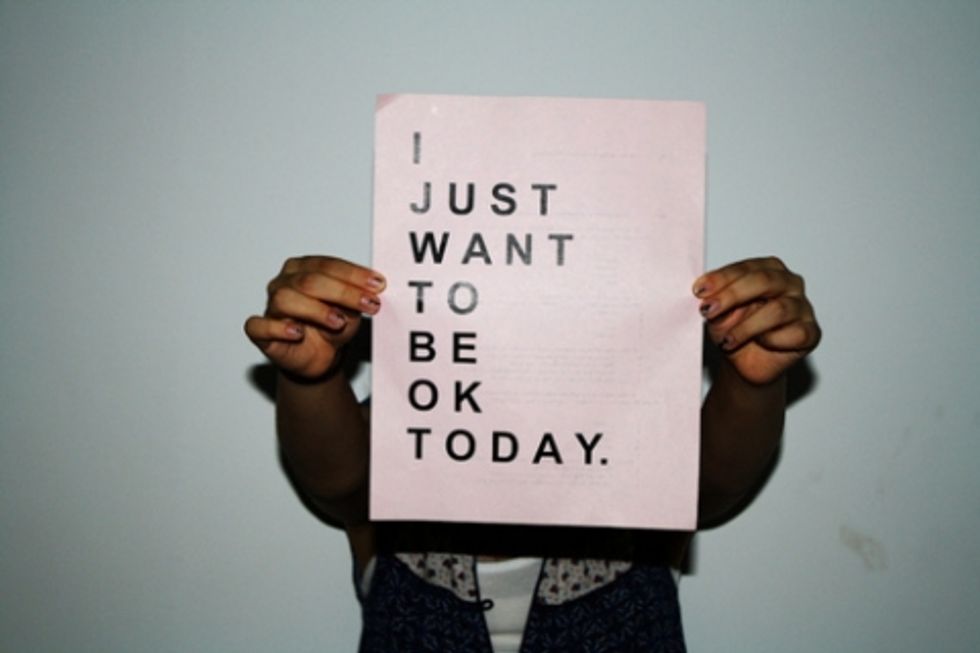Just a few weeks ago, I called up to Counseling and Disability Services at SEMO to try to get an appointment with a counselor. The woman on the phone told me that the counseling office, as well as the counselor training program, were booked up solid for the next three weeks. Tears in my eyes, shaking, I asked quietly, "Is there any other way you can get me in? It's urgent." She responded very frankly that usually, there are no cancellations and that I was probably out of luck. I thanked her and hung up the phone, then proceeded to cry about the entire ordeal, until she called me back ten minutes later and told me there was an opening for the next week. Then I felt a little better.
This is what living with anxiety is like, every day. You turn in a paper? You have anxiety about the grade until you get the paper back. You got a C- on the paper? You worry about how much that will affect your grade until the final. You have to walk by to your residence hall by yourself at night? You are terrified about campus crime.
Anxiety takes over your life.
What's even worse is that most Americans who have anxiety disorders either show symptoms before or during the college years (ADAA). So, on top of academics, extracurriculars, holding a job, and trying to have a social life, you have to deal with constant worry crushing your chest all the time. The apathy, insomnia, the attacks; they push themselves to the front, and it's a constant uphill battle to keep these things from defining you.
For people with anxiety, we have to work twice as hard to get where we want to be. When we'd just rather stay in bed, we have to force ourselves into a cold shower at 7 a.m. so we can force food down our throats and force our bodies into the classroom at 8 a.m. When we joined clubs we loved at the beginning of the semester, and then our anxiety worsened, so we are trying to stay involved, even though we aren't interested in much but Netflix anymore. When we have panic attacks at 1 a.m. because someone we don't know, six floors down, was almost hurt, and we have to calm down so we can drag ourselves into bed and start the process over again at 7 a.m..
There are good days. There are days when we feel amazing and lifted and out of the slump we had been in. There are days when we think, "I'm so proud of myself. I did good today."
Then, there are worse days. These are the days where we have panic attacks over burning our Easy Mac and have to take nearly an hour to calm down. These are the days when, no matter what we do, we don't feel happy about any of it. We can't take a joke. We can't be close with anyone but ourselves. These are the worst days.
Sometimes, you can't help but feel like you're broken; like you weren't put together right from the beginning. And sometimes, you can't help but feel like you're being over-dramatic or a burden to those around you.
Sometimes, you think, "I'm strong, I can get through this."
Anxiety is a series of mountains and valleys. You can be at the top of Everest, feeling so accomplished and proud, and one action, just one sentence, can send you tumbling back down to the low point.
The worst part of all of this is that anxiety is an invisible disease. To our professors, we might seem lazy. To our friends, we might seem like a drama queen. To our lovers, we may seem detached or unlovable. These people can't see what's actually going on. We don't get to wear a sign of our illness. We are terrified of being judged or written off, so we keep our anxiety to ourselves. We don't want to call attention to the fact that we are fighting this war with ourselves, but sometimes, it would just be easier to scream, "Don't you understand? I have anxiety!"
Don't write someone off so quickly as a drama queen, or as a slacker. Over forty million Americans suffer from anxiety. This means at least one person you know is probably dealing with the same obstacles as 39,999,999 other Americans. This means your brother, your aunt, your neighbor. Any one of these people is struggling, and you are labeling them for their symptoms, not their personality. Not only does anxiety take over how we feel, it takes over how other people feel about us.
You don't want to know how much this sucks.

















